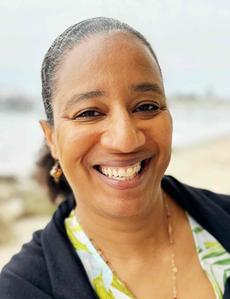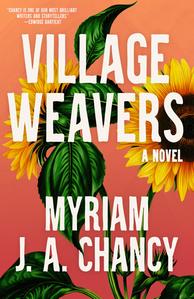
|
|
| photo: N. Affonso | |
Myriam J.A. Chancy's novel What Storm, What Thunder was named a Best Book of 2021 by NPR, Kirkus, Library Journal, the Boston Globe, and the Globe and Mail. She is also the author of several academic monographs, including Harvesting Haiti: Reflections on Unnatural Disasters and Framing Silence: Revolutionary Novels by Haitian Women. Her most recent novel is Village Weavers (Tin House, April 2, 2024), a story of two girls from Port-au-Prince, spanning decades and continents.
Handsell readers your book in 25 words or less:
Village Weavers travels to Port-au-Prince, Paris, Florida and more to uncover the divide between two girlfriends and their journey back to each other decades later.
On your nightstand now:
The Girl Before Her by Line Papin (translated by Adriana Hunter and Ly Lan Dill); Fire Rush by Jacqueline Crooks; Evil Eye by Etaf Rum; Ocean Stirrings by Merle Collins. Papin's book is a translation from the French about Vietnamese girls, following them from childhood to adulthood as they live through the Vietnam War and emigrate; it's written in lush, evocative prose. The other three novels provide insight into Caribbean and Palestinian lives. Merle Collins's novel is an epic retelling of Malcolm X's mother's story, from her great-grandmothers' lives down to her own; it does new things with the novel form and challenges me to think in new ways about what I'll do next in my own work.
Favorite book when you were a child:
The Black Stallion series by Walter Farley. I just came across a box set of the Farley novels in a little library in my neighborhood and it just made me smile and remember how I couldn't wait to get to the next volume in the series as a young reader. It also made me think about how to put stories together back then, wondering how Farley did it and how I might do it too someday.
Your top five authors:
James Baldwin, for writing complex novels that were far ahead of their time. Toni Morrison, for how she breaks the line. Paule Marshall, for writing that is timeless. Miriam Toews, for writing that it is both fine and full of humor in face of tragedy. M. NourbeSe Philip, for knowing how to speak to the dead.
Book you've faked reading:
Marcel Proust, À la recherche du temps perdu (In Search of Lost Time)--there are so many references to Proust's "madeleine" and mnemonics in literary fiction that it's hard to avoid having fake-read Proust but I do intend to read it (in the original) one day!
 Book you're an evangelist for:
Book you're an evangelist for:
Gloria Naylor, Mama Day. How Naylor breaks linear time and the divide between the life of the spirit and the "everyday" is remarkable.
Book you've bought for the cover:
Black Food, edited by Bryant Terry, and pretty much any cookbook I own.
Book you hid from your parents:
Books by Judy Blume because everyone in junior high whispered about them.
Book that changed your life:
Alice Walker, In Search of Our Mothers' Gardens, which led me to read the works of Countee Cullen, Langston Hughes, Virginia Woolf, and Zora Neale Hurston when I was a teenager growing up in the prairies of Canada, meaning, in virtual isolation from other people of African descent.
Favorite line from a book:
"Is? My baby? Burning?" --Toni Morrison, Sula
Five books you'll never part with:
Giovanni's Room, James Baldwin; Praisesong for the Widow, Paule Marshall; Their Eyes Were Watching God, Zora Neale Hurston; A Small Place, Jamaica Kincaid; The Grapes of Wrath, John Steinbeck.
Book you most want to read again for the first time:
Ava by Carole Maso. It's a novel written in a song cycle, telling the story of a dying woman's life. What Maso does with the idea of song, sound, the poetic line, and white space is unmatched in this novel.
Book you think more people should know:
The Marvellous Equations of the Dread by Marcia Douglas. Douglas's experimental novel might seem, on the surface, to be about Bob Marley's death and legacy, but it is, in fact, about the women and children of Jamaica, Rastafari women, and the legacy of reggae, dub, and other forms of resistance created from the Tainos to the Maroons, to the creators in Trenchtown; Leena, the main character, is a deaf woman. I teach it almost every year and never tire of reading it: the book resonates with love and is written in such a way that there is always more to discover. It's also a student favorite so I think more people should know about it.
A recent book more people should read:
The Testaments by Margaret Atwood. The surprising way in which Atwood closes out The Handmaid's Tale is surprising and pitch-perfect.

